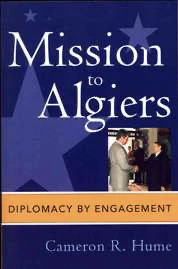Back to Diplomats and Diplomacy
Mission to Algiers: Diplomacy by Engagement
 “At a time when the United States is encouraging democratic development in the Middle East, the Algerian case of partially successful transition to democracy should be better known. This is a good case study of what an ambassador actually does on a day-to-day basis . . . a well-written firsthand account of recent history.”
“At a time when the United States is encouraging democratic development in the Middle East, the Algerian case of partially successful transition to democracy should be better known. This is a good case study of what an ambassador actually does on a day-to-day basis . . . a well-written firsthand account of recent history.”
––WILLIAM B. QUANDT, University of Virginia
By 1990, as the state-controlled Algerian economy careened toward the brink of bankruptcy, its government began to turn away from one-party rule and toward democracy. But after the government canceled an election that Islamist parties were poised to win, the ensuing Islamist insurgency killed as many as 100,000 and threatened the country’s stability. As ambassador to Algeria from December 1997 to September 2000, while the government in Algiers grappled with the insurgency Cameron Hume led the U.S. effort to expand bilateral relations and encourage political and economic change in this key Arab country.
An astute observer and unusually creative diplomat, Cameron Hume provides timely insight into these dramatic developments. He recounts both progress and setbacks in U.S.-Algerian relations and the parts played by the leading Algerian and U.S. political, diplomatic, and military actors. In the process, he provides a hands-on case study of how an ambassador deals with an important bilateral relationship at a time of crisis.
Cameron R. Hume was a career U.S. Foreign Service officer from 1970 to 2010, retiring with the rank of Career Minister. After assignments in Italy, Tunisia, Syria, Lebanon, the United Nations, and the Holy See, he served as ambassador to Algeria, South Africa, and Indonesia and as chargé d’affaires in Khartoum. He is the author of The United Nations, Iran and Iraq: How Peacemaking Changed (1994), Ending Mozambique’s War (1994), and numerous articles on foreign policy, has been a fellow or guest scholar at the Council on Foreign Relations, the Harvard Center for International Affairs, and the U.S. Institute of Peace, and is a graduate of Princeton University and American University School of Law.
